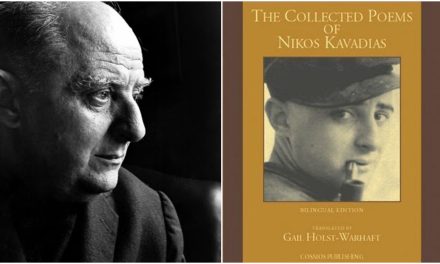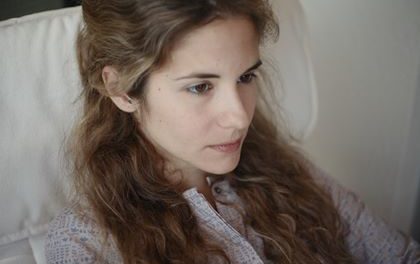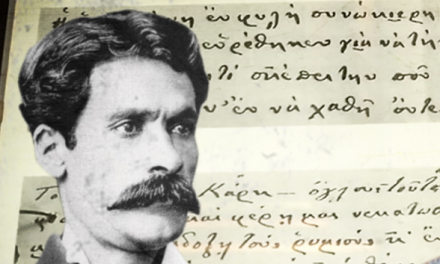Τhe 11th Thessalian Poetry Festival opens its gates from 21 to 25 August with the participation of a great number of Greek and foreign poets, musicians and artists, in five days full of poetry readings, artistic events and live music performances.
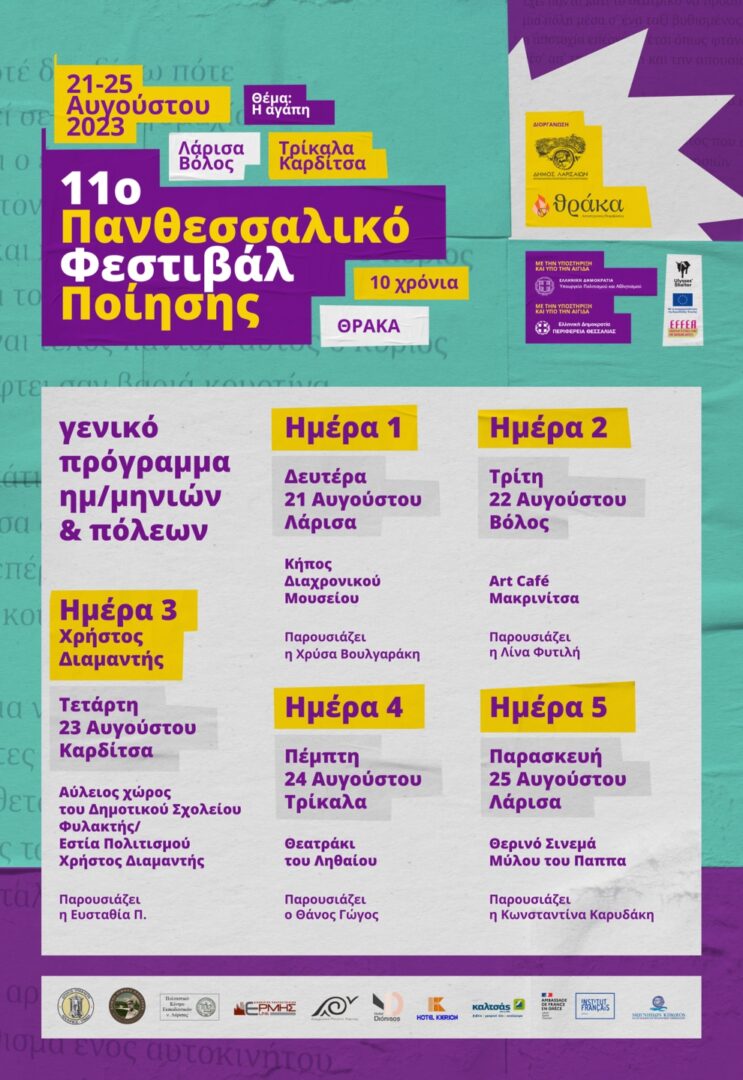
Organized by the publishing house Thraka, which this year celebrates its 10 years of operation, in collaboration with the Mayoralty of Culture and Science of the Municipality of Larissa, and held in four cities in Thessaly – Larissa, Volos, Trikala and Karditsa – the festival’s aim is to gather new talented poetic voices alongside already established poets in order to bring a renewed interest in culture and poetry and to act as a meeting point for poets of different generations, countries, and cultural traditions. In the words of the festival’s director, Thanos Gogos, “from ancient times to the present, poetry has been a means of expressing love from humanity to humanity. It is a deeply human phenomenon rooted in the desire to create and express, in the very need to exist, but also a deeply social phenomenon; an invitation to connect, to embrace, to understand each other, since poetry does not exist without those who read and reflect on it”.
Every year, the board of the festival chooses a theme – an idea or a message that we want to emphasize with the festival’s program. This act is not merely decorative or superficially conceptual, but rather purposeful and rooted in a belief that culture can be an active co-creator of its context, and in some way, affect its surroundings. “This year’s theme, love, was chosen because love is the root of everything that is good. In a time of destruction, polarization, violence, loneliness, and exploitation, love is a force that can heal us both individually and collectively – and poetry is one of the most impactful, the strongest, but also the most tender, manifestations of love”, stated Marija Dejanović, the festival’s assistant director and part of the organizing team, which also comprises Thanos Gogos, Efstathia P, Afroditi Sereti, Christos Koltsidas, Lina Fitili and Nina Kapsali.
The program includes poetry readings by 58 Greek and 14 international poets. Regarding the Greek poets, the program combines the living classics, the middle-generation poets with strong, established voices, and a younger generation of authors who have already showed great potential. Besides the age and gender balance in the program, which is a rarely-seen, but much needed phenomenon, the program also makes sure to include excellent Thessalian poets, thus balancing the representation of great local poetic forces, and their peers from the other regions of Greece.
These are the Greek poets who are participating in the program:Costas Ladavos, Sotiris Pastakas, Dimitra Christodoulou, Niki Halkiadaki, Lina Fitili, Antonis Balasopoulos, Pavlina Marvin, Vasilis Moschos, Alexandros Stefanidis,Nikos Varalis, Angeliki Thanou, Sokratis Kabouropoulos, Eleni Kosma, Apostolos Pantsas, Lina Fitili, Elena Psaralidou, Haritini Malissova, Mina Patrinou, Dimitra Saharidou,Vagia Kalfa, Viki Brousali, Vangelis Tasiopoulos,Dimitris Vasilakis, Georgia Diakou, Christos Koltsidas, Ilias Bartziokas, Vangelis Brianas, Panayiotis Nanos, Rania Orfanakou, Viki Triantafilou, Katerina Iliopoulou, Antonis Skiathas, Ilias Kefalas, Irini Rinioti, Spiros Chairetis, Efstathia P. (tria epsilon),Agathoklis Azelis, Georgia Koloveloni, Vaso Christodoulou,Koula Adaloglou, Petros Gkolitsis, Sofia Gourgouliani, Thanos Gogos, Eleni Laki, Anna Manolopoulou, Chrisa Mastrodimou,Dimitris Athanaselos, Chrisa Alexiou, Eleni Anastasopoulou, Labros Anagnostopoulos, Ioanna Giannakopoulou, Pinelopi Zardouka, Pavlos Kastanaras, Ilias Kourkoutas, Efthimios Lentzas, Labros Papadimas, Giorgos Saratsis.
From the international poets, there are the French Academy “Heredia” Award-winning poet Joël Vernet, as well as the German poet Ron Winkler who is considered to be one of the major voices of European contemporary eco-poetry. Tatev Chakhian, a poet who deals with issues of migration, and Madara Gruntmane, a Latvian feminist poet who writes about gender-related violence and mental health, will also be present. In the festival’s program are also included the Oxford-based classicist scholar and poet from Portugal, Tatiana Faia, whose work presents and reinvents the motives from the classical world, multiply awarded Croatian poet and playwrite Marija Dejanović, as well as many other great poets, such as Sergej Harlamov (SI), Lara Mitraković (HR), John Tripoulas (US), Ivana Maksić (RS), Efe Duyan (TR), Don Schofield (US), Ardita Jatru (AL), and Dragica Anta Đipalo Patsea (RS).
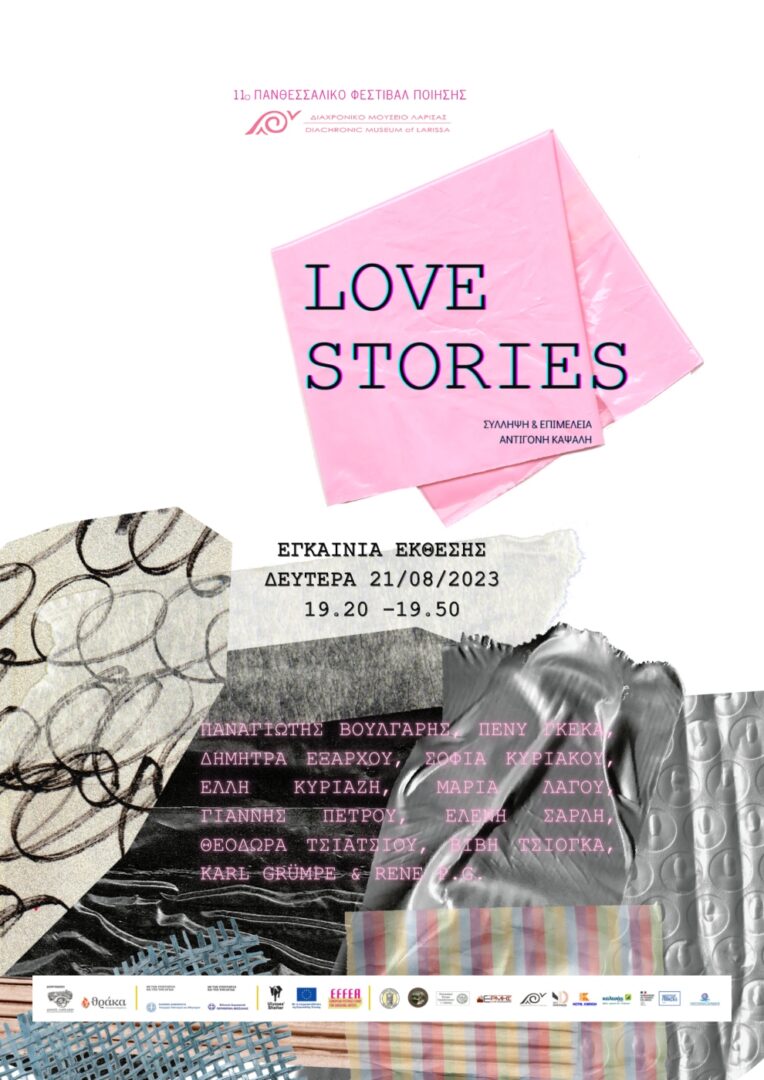
During the first day of the festival, there will take place the opening of the contemporary art exhibition titled “Love Stories” designed and curated by Antigoni Kapsali at the Diachronic Museum of Larissa. The exhibition consists of visual objects known as “artist books” that explore the concept of love. Artist books are works of art that utilize the form or concept of the book and are three-dimensional constructions in various visual styles depending on the artistic style of their creator. Thus, the exhibition consists of two types of exhibits. The physical, three-dimensional, presence of the work preserves the “traditional immediacy” that characterizes the relationship between visual work and audience. Its digital version penetrates the personal space of the viewer – recipient, creating another level of interaction.
Τhe festival’s programme also includes the award of two prizes: the Makis Lachanas Award to Sotiris Pastakas for his valuable contribution to Greek poetry and the Thraka Award for the best unpublished first poetry collection to be announced during the festival’s inaugural ceremony. During the festival, there will be a presentation of two international literary residencies programs: Ulysses’ Shelter (founded by Creative Europe) and “Counterpoint: narrating migration from the Periphery as Centre” (financed by the EFFEA). The programme also includes the presentation of the Greek queer poetry anthology (published in cooperation with Rosa Luxemburg Greece Stiftung Office in Greece), as well as audiovisual poetic performances by Sissy Doutsiou and Tasos Sagris, and live music events by live music by Dimitris Bournakas and Kostas Kostoulis (Larissa), Spiros Kavalieratos (Volos, Makrinitsa) and Eleni Alexiou (Trikala).
Τhe festival is organized with the support and under the auspices of the Ministry of Culture and Sports and the Thessaly Region, as well as with the support of the Municipality of Trikala, the Municipality of Lake Plastiras, Magniton Kivotos, the Diachronic Museum of Larissa, the French Institute of Larissa and the Cultural Center οf Teachers of the Larissa Region, Kierion Hotel, Dionysos Hotel and Kaltsas Bookstore. In the words of Panos Sapkas, Deputy Mayor of Culture of Larissa, “the Thessalian Poetry Festival can play an important role in the closest possible relationship between people and poetry, but also in the interaction between poets and ultimately in the spiritual uplift of the country. And this is the real value of the festival. It’s a festival that we created with a lot of effort and care, and which gradually acquired a pan-Hellenic and international character, making our city a center of poetry in Greece”.
A.R.
Read also: Ulysses’ Shelter: Building Literary Bridges Across Countries; Reading Greece: Thanos Gogos on Literature as a Means to Balance in Emotionally Turbulent Times and Struggle in Socially Dynamic Ones; Reading Greece: Marija Dejanović on Art as Inherently Political and Poetry as a Form of Writing that Can Create a Radically Different Reality; Reading Greece: Efstathia P. (tria epsilon) on Bringing the Voices of Women to the Forefront as a Means to Reshape Reality
TAGS: LITERATURE & BOOKS | READING GREECE


